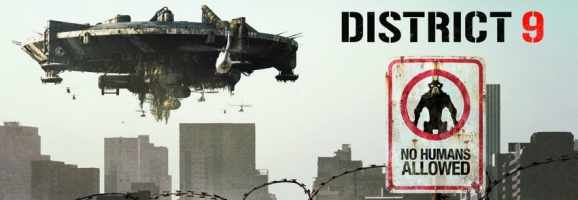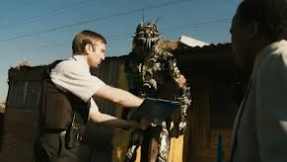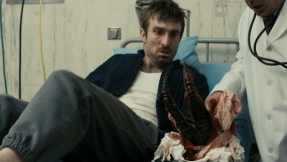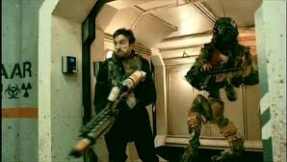District 9: A Post-Colonial Analysis

Neil Blomkamp’s District 9 narrates the story of an alien invasion where humans treat the aliens as refugees. The story begins by providing historical background on the sudden appearance of a spaceship hovering over Johannesburg, South Africa. At first, the aliens receive assistance from citizens, yet tension gradually rises: people begin to feel that the aliens have prolonged their stay. Over time, people segregate the aliens, treating them as refugees.
The plot focuses on Wikus van der Werwe, a head operative of the M.N.U. in charge of relocating the aliens from District 9 to District 10. As Wikus evicts the aliens, he encounters Christopher Johnson, an alien who shows more knowledge compared to the rest of the aliens since he is aware of how to distinguish alien technology from human technology. In addition, he’s aware that alien technology provides the black liquid needed to fuel the spaceship and leave Earth. Furthermore, his home reveals various computer hardware, implying that Christopher Johnson is technology-oriented, as opposed to the rest of the aliens that are worker-oriented. During the relocation, Wikus is exposed to an alien chemical, gradually transforming him into an alien. Although Wikus confiscates the black liquid, his transformation accelerates, horrifying him and other people. Because his transformation allows him to operate alien technology such as weapons, he’s hunted by the M.N.U. Persecuted and alienated, Wikus finds shelter with Christopher Johnson and his son. Together Wikus and Christopher Johnson recover the black liquid, which will allow Christopher Johnson to return home and provide Wikus with a cure to return to his former state.
Wikus van der Werwe works for the government “engag[ing] with the prawn on behalf of M.N.U. and on behalf of humans.” In order to appease the demands of the Johannesburg citizens, the Multi-National United assigns Wikus and his team to evict the aliens from their residences and re-assign them to District 10, moving them away from the populated city and relocating them to an isolated area. In the beginning, audiences observe how Wikus and his team treat the aliens. While the military prefers to shoot and kill any aliens unwilling to concede, Wikus prefers to engage with the aliens in a non-aggressive manner. However, when Wikus discovers a shack filled with eggs, he performs an abortion. Although Wikus follows direct protocol, he fails to recognize that he’s exterminating a species. Wikus displays no remorse towards his actions, suggesting that he’s adapted to the government’s policies. These two separate acts reveal the hypocritical nature of the government’s involvement. Although the M.N.U. claims to have the aliens’ best interest at hand, their motivation is purely self-interested.
Settler Colonialism

The alien refugees are an example of a settler colony. Patrick Wolfe argues that “settler colonialism destroys to replace” (388). Wolfe argues that settler colonialism and genocide does not target particular races but is “made in the targeting” (388). Wolfe’s statement suggests that there is a process to replacement. In the case of District 9, humans are interested in the weapons, while the aliens are engrossed with the cat food. While settler colonialism encourages exchanging resources and language, this positive attitude gradually evolves to fear and hatred. Furthermore, it is not surprising that the settled colony faces oppression. One commentator in the film argues, “The legality that M.N.U. is using to evict the aliens is simply a whitewash.” While the M.N.U. claims the removal of the aliens is due to humanitarian reasons, the central focus, as the film points out, is weapons. Although the arrival of the aliens disrupts the daily lives of citizens, this also provides the M.N.U. with rich resources. To the dismay of many citizens, the aliens inevitably live in Johannesburg, and the government reacts by removing the aliens into a remote piece of land. This government action reflects settler colonialism. In this case, the aliens have settled in District 9, while the M.N.U. assume authorial power. The objective of settler colonialism relies on acquiring indigenous territory and resources, resulting in exterminating the natives. According to Lorenzo Veracini, he argues that the aliens in District 9, along with “indigenous peoples in other settler colonial settings,” represent “obstacles,” therefore, people have no use for them except for the land they inhabit (361). Through colonialism, the indigenous expose and share the culture with the colonists. With colonialism, this brings interbreeding between different racial groups through marriage or sexual relations known as miscegenation.
Miscegenation
According to Wolfe, he argues that settler colonialism “encourage[s] miscegenation” (388). District 9 refers to miscegenation twice in the film: once when the film details a prostitution ring between humans and the aliens, and a second time when Wikus begins to transform into an alien and reports of inter-species relations claim to be the cause of his transformation. These false reports not only alienate Wikus, but also show the concerns of miscegenation. When news spread that intersexual relations with an alien is the cause of Wikus‘ transformation, people show alarm and disgust, suggesting that race-mixing is not acceptable. Since people oppose the interbreeding between alien and human, this reveals hatred toward the other race. As Wikus progressively transforms into an alien, he becomes someone who rejects his own race. According to F. James Davis, people who are “racially mixed” are “socially marginal,” meaning they are not accepted from either parent group, leaving them susceptible for discrimination (25). The transformation horrifies Wikus. After black bile drips from his nose and losing several of his fingernails and teeth, Wikus still denies his change. As his arm changes into an alien claw, Wikus tries to cut off his own hand, leading him to cry out in pain. Since Wikus feels pain when he cuts off a finger, this shows, to Wikus‘ horror, that the alien arm is a part of him. His transformation represents the fear of and realization of the “one-drop rule.” According to Davis, a drop of “black blood” defines a person as black (5). Because Wikus denies his race, he recognizes that aliens are inferior to humans. He knows that as a human being he retains certain rights and privileges; additionally, he’s fully aware that aliens are not accepted by society. If society allows miscegenation, this brings peace and harmony among race relations. However, since society prohibits miscegenation, there exists no balance between humans and aliens.

Due to the sudden exposure of alien biotechnology, Wikus experiences an unfamiliar culture, causing him to interact with the aliens, specifically Christopher Johnson and his son. This exposure allows Wikus to identify with the aliens, permitting Wikus to grow sympathetic towards the aliens. Because of his gradual transformation into an alien, Wikus is experimented on by scientists from M.N.U. experiment on Wikus to test various alien weapons. After shooting various animal carcasses, the scientists order Wikus to shoot an alien. Although he refuses to shoot, Wikus is ultimately forced to kill the alien. During his stay with the scientists, Wikus becomes aware of the unfair violence and abuse towards the aliens. In the case of Christopher Johnson, he and Wikus unite and fight together for separate reasons: Christopher Johnson wants to go home and Wikus wants a cure that only Christopher Johnson can provide. As Wikus continues to transform, his perception on the aliens changes. Towards the end of the film, Wikus leaves Christopher Johnson to face a brutal death, yet he saves him, an act which displays sympathy and acceptance of not only the alien who promises to cure him, but also acceptance of his own race.
Xenophobia

Once Wikus separates himself from society, this leads the audience to “identif[y] with the protagonist,” building “tension and identification…used to deliver a powerful critique of contemporary developments” (359). Apart from miscegenation, the film critiques issues of xenophobia and “privatized violence” (359). The commentary provided at the start of the film reveals xenophobic attitudes towards the aliens.
The aliens are evicted from the townships, living away from human beings. Footage reveals that there are hate crimes against the aliens (i.e. shooting riots and burning down the aliens’ homes). The film also depicts citizens segregating the humans from the aliens. By relocating the aliens from District 9 to District 10, people hope the violence will cease; however, the relocation allows people to avoid confronting and resolving the racial problems.
The film’s antagonist, Koobus Venter, serves in the military and displays a ruthless and callous attitude towards the aliens. Since Koobus displays xenophobic behavior, this suggests that xenophobia is a common attitude among Johannesburg. Although xenophobia pertains to the irrational fear or hatred towards foreigners, xenophobia does derive from a cause. Xenophobia can arise as a result of poor education or alienation of those that are different. Another cause of xenophobia is propaganda. At the beginning of the film, audiences see signs displaying segregation, visually dividing the humans from the aliens. The use of racial propaganda manipulates the information and influences people to believe one side of the argument, thereby creating stereotypes. The aliens, for example, receive the derogatory name “prawn” to indicate their appearance and low rank. Because the film depicts xenophobia, this provides a critique on a social issue, suggesting an act to reform.
As the film tackles themes and social issues such as xenophobia, miscegenation, and privatized violence, the film reveals humanity’s cruel nature. District 9 is not just a science fiction film, but a film depicting issues of race that still remain relevant to this day.
Work Cited
Davis, F. James. Who is Black? One Nation’s Definition. 10th ed. Pennsylvania: Penn State University Press, 2001. Print.
Veracini, Lorenzo. “District 9 and Avatar: Science Fiction and Settler Colonialism.” Journal of Intercultural Studies 32.4 (2011): 355-367. Academic Search Complete. Web.
Wolfe, Patrick. “Settler Colonialism and the Elimination of the Native.” Journal of Genocide Research 8.4 (2006):387-409. Academic Search Complete. Web.
What do you think? Leave a comment.











Best sci-fi movie since The Empire Strikes Back
I loved this movie then (I also saw it in a theater when it first came out) and love it still.
Same here. When I first saw the movie in theaters, I didn’t know what to expect, but I’m glad I saw it.
On second viewing of the intro, those people in charge of government and bureaucracy must be out of their minds. Who thought up and went with that idea of concentrating 1 million new aliens residing in a district of a city with 5 million people.
If anything, the immediate concern was to create separate refugee camps away from the ship and then set up dedicated labs directly under to inspect it. Not to mention it took 28 years to finally decide to evict them?
Nevertheless, we wouldn’t have an amazing movie that has themes about real life aliens, poverty, slums etc if the government was actually smarter then.
It is sad to watch a movie that depicts real-life social issues, yet I think it’s good to portray and discuss those issues because this states the problem, allowing people to become aware and call for action.
I thought about that flaw in the government procedure, too. But, on the other hand, they’re not telling us about the huge international interests, pressures and negotiations involved in the decision about how to proceed with the aliens, in the first place (and the mothership in the second which could be a much more complex issue), nor about the details of the decision-making process about them. We know that there are parts of society which defend them and these could have taken a no-interference stance, leading to legal implications in the relocation of these beings.
I think the movie, among other things, in its use of a fictitious scenario as a depiction of apartheid, tries exactly to illustrate this: how a government, by being incompetent and leaving matters into the wrong hands, can turn the lives of many people into a living hell.
well if you think about it, the prawns had the technology to fly away the whole time. yet they didn’t. it took them 20 years to scavenge their own tech, something that was already aboard their ship, before they could fly away again. huge plot hole that well paid writers could have covered up.
When I read your article the first time, you made me watch the movie again.
I love your article. It is well informed and insightful. I look forward to reading more from you.
Thank you! I appreciate your positive feedback!
This is a very thorough review. You touched on many points that I did not realize that were in the movie. For example the miscegenation, it made me look at the movie through a different angle instead of watching it as just a sci-fi. Great article!!
Thank you! I took an anthropology class focusing on the biological rather than the cultural aspects. So when I re-watch District 9, a lot of the lecture resonated within the film. Thanks again!
The film is a fantastic examination of humanity, and inventively does this through humanising the prawns rather than us.
I was quite disappointed with ‘Elysium’ because it was being touted as the new film by visionary director of ‘District 9’ but turned out to rip off practically every Sci-Fi film I’d ever seen, right down the ending being the exact ending to ‘Armageddon’. I still enjoyed it but I expected more from a “visionary director”. This was all before I’d seen ‘District 9’ at all. After seeing it, I’m even more disappointed with ‘Elysium’ and what it could have been.
And while I agree Copley was badass in ‘Elysium’, I think he fit the character of Wikus a lot better.
This is one of the best sci-fi movies ever. Elysium is a mediocre movie with atrocious acting from Jodie Foster (who I generally love), its only real strong point is Copley’s performance.
It was pretty much only made to serve as political propaganda.
It was a very impressive debut, by Copley but especially by Blomkamp, which is made even more impressive when you see the budget. ‘Elysium’ turned out to be a much better follow up for Copley than it was for Blomkamp but I certainly look forward to seeing more of them both in the future.
Very intriguing analyses. Pretty inventive film indeed.
This is what science fiction should be – using plausible science to illuminate aspects of the human condition. You make a great case for why District 9 is so good at this. It’s even better that its messages are wrapped up in breathless action sequences and an innovative mockumentary style!
I never viewed the film with the idea of colonialism in mind, with the clear themes of race and segregation always being the most dominant. Definitely something very interesting to consider and warrants a reviewing of the film, as if a reason was ever necessary.
This article and the film itself definitely gives us a lot of food for thought about these issues. A very interesting read!
I also thought this was a very well made movied. Not at all like usual Alien fare. As an audience you really identify with the aliens instead of seeing them as monsters. Very thought provoking article.
Surprisingly well made movie that came out of no where. The director does tackle similar stuff in his other movie, Elysium. I like him. He got it all, action, Sci-fi and though provoking story lines.
I like that this film “humanizes” the aliens, considering that in most sci-fi flicks, aliens are portrayed as monsters that humans must defeat or run away from. It is obvious in the film that the aliens are being terribly mistreated, which makes viewers ask: If it isn’t ok to treat aliens in such a way, why is it acceptable that so many humans have been treated this way, and are continued to be treated this way?
You know, I wonder how much of the mistreatment in general, in real life, actually stems from the animalistic portrayal of foreign entities to begin with. Couldn’t this also work as propoganda in a similar way as the author mentioned in her article?
Excelente Amanda! Los asuntos de derechos humanos, son asuntos de primera importancia que sólo con educación pueden transformar ese tipo de cultura.
Really great perspective to take on this movie. I didn’t think about it at the time but, looking back, this is a very post-colonial narrative. Great points!
I think your analysis is spot on! You bring up a good point with regard to Wikus marginalization because of his becoming an alien, and this is very much reflected in today’s society. Keep up the good work!
Great film!
Thank you for this intuitive analysis. While the metaphorical analysis of South African apartheid is definitely impactful, I find the film marred by its orientalist presentation of its actual minorities; the Nigerians. They’re presented as cannibalistic savages who engage in black magic and violent crimes which sort of diminishes the validity of the film’s commentary on oppression and segregation in my opinion.
These all sound like familiar themes to 2014.